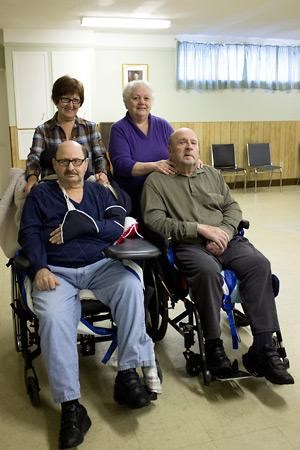A small group in Powell River has been making a big difference for people who return to their daily lives after having a stroke.
Powell River Stroke Recovery Club, run by a group of dedicated volunteers, has been helping bridge the gap in community health care for more than 30 years.
According to the Stroke Recovery Association of BC (SRABC), a provincial non-profit organization, there are few resources for people who suffer strokes and stroke recovery groups offer people a chance to work on improving their quality of lives.
Strokes happen when blood vessels inside a person’s brain either rupture or blood flow to tissue is restricted when a clot becomes lodged in narrowing vessels. The effects of strokes vary on where inside the brain they happen.
Irene Osmond and Therese Darveau, members of the club’s caregivers group, have husbands who had strokes that affect the left sides of their bodies. Though their speech ability was left intact, both men have balance issues and have restricted mobility in their left arms and legs.
Irene, who worked as a nurse aid at Olive Devaud Residence, and her husband Gordon, 73, have been attending the club for the past eight years. Gordon had a his stroke, a bleed, almost nine years ago. They discovered the club after Gordon returned from Nanaimo to Evergreen Extended Care Unit.
“We come here on Tuesdays and he comes home on Fridays for lunch,” said Irene. “We play shuffleboard. He laughs. He loves it.”
Therese and her husband Yvon have been going to the club for the past seven years. She said that for the first six months after the stroke, Yvon was making progress and was even relearning how to walk, but frequent small seizures erased any gains he made.
“One day he was so proud, he walked from the door to his seat [at the club] by himself because he saw other people that have recovered and learned to walk here,” said Therese. “Seeing people really encouraged him.”
Yvon stayed at home for five years and for the past three he has been in extended care, she said, explaining that he regressed to the point where she could not take care of him at home without injuring herself.
“It’s very depressing after awhile,” said Irene. “You just wear yourself out.”
The caregivers group gives spouses a chance to talk about their challenges and frustrations in a safe environment where experience provides for empathy.
“Once you leave the rehabilitation facilities and come to Powell River there is no physiotherapy,” said Therese, adding that private firms exist but can only help their husbands to a certain point. “The only hope you have is to come here to the stroke recovery club.”
Retired nurse Trudy Simpson has been the club’s coordinator since 1995. She said the biggest challenge for the club is that people are unaware that it exists. It has between 25 to 30 members who have suffered a stroke (numbers vary from year to year) and their caregivers. Approximately 20 volunteers provide support for members through various means whether it be through helping members work on their speaking or getting a little exercise.
“We usually have 12 to 15 at meetings,” said Simpson. “They are really wonderful.”
People who have suffered a stroke often spend the rest of their lives learning to live with the permanent impacts on their abilities to speak, walk and control their bodies. Simpson said that because there are not any speech specialists in Powell River, the club often uses its donated funds to have a speech pathologist from Vancouver Island visit and help give assessments of members and provide volunteers with some training on how to help.
The group, funded by donations, meets on Tuesday mornings each week in the basement of the Royal Canadian Legion on Alexander Street.
Simpson said that for the majority of people who are making donations, their first thought is to give money to the Heart and Stroke Foundation of Canada, but she said that if it is given to that organization the money leaves the community.
“To keep your funding local it has to go to the Powell River Stroke Recovery Club,” she said.
People interested in volunteering or making a donation for the club can contact Simpson at 604.485.6396 or [email protected].



